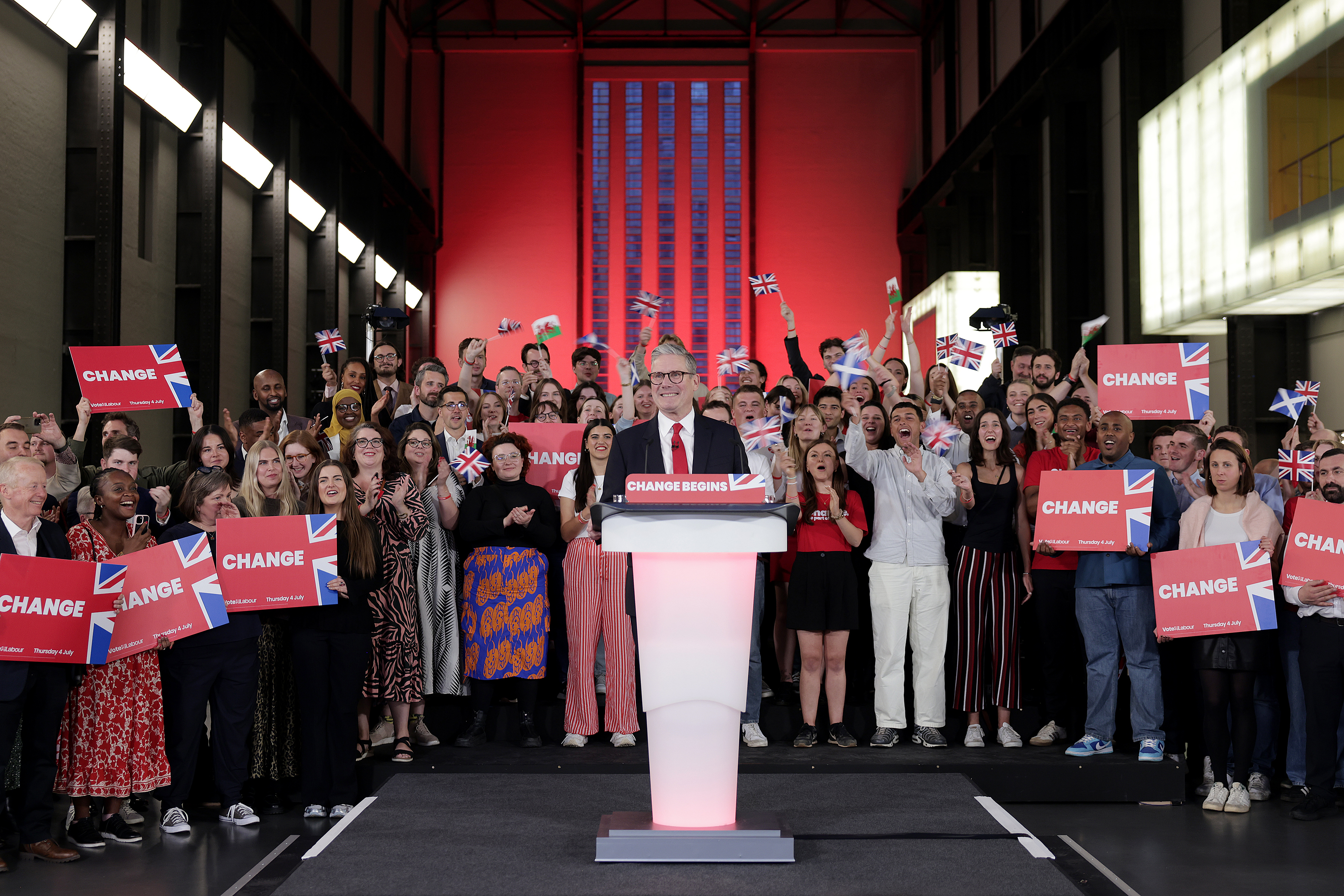On the eve of polls opening in the UK, Labour Party leader Keir Starmer (61) allowed himself a moment to reflect on how far he had come since he took over its reins four-and-a-half years ago. Back then, the party was reeling from one of the worst defeats in its 100-year history.
“The optimists said it will take 10 years to fix this party and get it back,” he told reporters. “The pessimists said you’re never going to fix this party; it’s never going to be in government again.”
Starmer has now led the Labour Party to victory, and the biggest majority in Parliament since Tony Blair’s New Labour landslide in 1997.
The UK’s presumptive prime minister has far outperformed the expectations of his chances when he took over from the hard-left Labour leader Jeremy Corbyn in 2020. Bland, boring, “no Tony Blair”, as focus groups often describe him, this relative newcomer to the world of politics has, in part, been a beneficiary of circumstances.
Boris Johnson’s “partygate” scandal and Liz Truss’s “mini-budget” – which tanked the pound – came at the tail-end of years of Conservative austerity that made deep cuts to many public services. All have contributed to the result we have now seen in the British general election. But Starmer has had his part to play too, demonstrating a quiet ruthlessness in changing his party, purging the Corbynites, even expelling Corbyn himself, and bringing it into a position to win and govern again.
“It feels good, I have to be honest,” Starmer told Labour supporters in London after the party crossed the crucial 326-seat threshold in the House of Commons, adding that he knew “a mandate like this comes with a great responsibility”.
He will now have to show whether those same skills that got him into 10 Downing Street will help him to resolve a staggering list of challenges. Britons are bruised by the impact of Brexit, the pandemic and a historic squeeze on living standards.
His government faces a more dangerous world and has little money to spend on improving the situation at home without raising broad-based taxes, something he has said he does not want to do.
Humble beginnings
Despite being known as “Sir Keir” – he was knighted for his legal career before entering politics – Starmer had humble beginnings. He grew up in Oxted, a London commuter town in the Surrey countryside. He was one of four children to a toolmaker father and a mother with a debilitating autoimmune condition, which meant she had to give up her work as a nurse while Starmer was a child.
Starmer was the first in his family to attend university. He studied law at Leeds, graduating with honours, and was accepted to Oxford University for a prestigious year-long graduate law course.
Starmer then became a respected human rights lawyer, known for his pro bono work. He was appointed Queen’s Counsel in 2002, a few months before his 40th birthday.
He was director of public prosecutions (DPP) from 2008 to 2013. The role put him in charge of delivering criminal justice in the UK, running a large organisation of thousands of staff and lawyers during a period of major budget cuts.
After his time as DPP ended, Starmer stood for election in the safe Labour seat of Holborn and St Pancras in the May 2015 general election, expecting to be attorney-general in Ed Miliband’s cabinet. Instead, he went straight to the opposition benches and joined a Labour parliamentary party tearing itself apart after a shock defeat.
During the Corbyn years, Starmer, a remainer, rose through the ranks to become shadow Brexit secretary. Whereas colleagues like Rachel Reeves refused to serve under Corbyn or resigned from the party altogether over antiSemitism, Starmer stayed.
But by March 2018, Starmer and his allies – frustrated by the antiSemitism problem and by Corbyn’s foreign policy stances – knew he would stand for party leader when the time came, which happened in 2020. Starmer ran, and won, a leadership campaign centred on 10 pledges to Labour members, essentially to retain the radical spirit of the Corbynite agenda with promises such as renationalising rail, mail, energy and water.
Since taking over the leadership, Starmer has expelled Corbyn from the party, introduced mandatory antiSemitism training and vigorously vetted, and sometimes imposed, candidates who will be loyal to his leadership. He has instilled a tight fiscal discipline, ditched almost all his original leadership pledges, and draped his party in the union flag and embraced the language of security, discipline and patriotism.
It has not all been plain sailing. He lost the Hartlepool by-election early into his leadership in 2020, after which he considered resigning. The experience hardened his determination to overhaul his party.
Read more in Daily Maverick: New PM Starmer pledges to rebuild Britain after years of chaos
More recently, Starmer suffered a protracted and public disagreement among his top team over whether to ditch Labour’s pledge to spend $36-billion a year on green infrastructure, culminating in a major reversal. He faced criticism and lost votes over a radio interview in October in which he said Israel “has the right” to withhold power and water from Gaza, for which he later apologised.
His team of advisers has been accused of heavy handedness in their purging of the Corbynite wing and in their wider attitude to the party’s elected representatives.
Though his dissenters baulk at how different he is to the man who stood for leader four-and-a-half years ago, Starmer is proud of that difference.
“I changed my party,” he says. “Now I want to change the country.” – Bloomberg/DM
This story first appeared in our weekly Daily Maverick 168 newspaper, which is available countrywide for R35.






